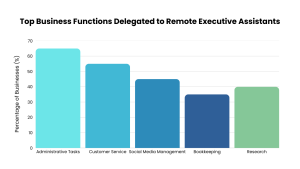
This chart shows the most common tasks businesses assign to Remote Executive Assistants, from administrative support to client communications, helping teams save time and focus on high-value work.
1. Keeps You Focused on High-Impact Work
Think of how many hours you spend in your inbox, on scheduling calls, or tracking down documents. A Remote Executive Assistant can manage your emails, coordinate your calendar, prepare meeting materials, and follow up on action items, all without you lifting a finger. A constant interruption from admin work can hold leaders back from strategic thinking, making the ability to delegate these tasks not just convenient but essential for growth.
Example: A property manager juggling multiple communities can have a Remote Executive Assistant organize vendor bids, draft board meeting agendas, and track maintenance schedules, freeing them to focus on client relationships and service quality.
2. Cuts Costs Without Cutting Quality
Hiring an in-house assistant comes with extra expenses: office space, equipment, benefits, and taxes. This allows you to redirect your budget toward growth initiatives like marketing, product development, or client acquisition. Small and mid-sized businesses can match the operational capabilities of large corporations without the high overhead, allowing more resources to be directed toward growth initiatives.
Example: A law firm owner can hire a Remote Executive Assistant to prepare case documents, handle client intake calls, and manage appointment schedules, all without paying for additional office space or full-time benefits.
3. Keeps Operations Organized and On Track
A great Remote Executive Assistant doesn’t just complete tasks, they manage systems. They can set up project management boards, monitor deadlines, and ensure all stakeholders are updated. This means fewer dropped balls, faster turnaround times, and smoother collaboration across your team.
Example: A marketing agency can have a Remote Executive Assistant handle campaign timelines, coordinate with designers and copywriters, and keep deliverables on schedule while the creative team focuses on strategy.
4. Scales With Your Business
Your workload isn’t always steady, it spikes during busy seasons, new launches, or expansion phases. A Remote Executive Assistant can adapt to your needs, whether you require part-time support now and full-time later, or help with specific projects.
Example: An e-commerce business preparing for the holiday rush can bring on a Remote Executive Assistant to handle customer inquiries, process orders, and manage vendor communications, scaling back after the busy season ends without going through lengthy hiring or termination processes.
5. Brings Strategic Insight, Not Just Task Support
Many Remote Executive Assistants have backgrounds in operations, finance, customer service, or project management. This means they can suggest process improvements, identify efficiency gaps, and even help with data tracking to support better decision-making.
Example: A startup founder might rely on their Remote Executive Assistant not only for scheduling investor calls but also for preparing pitch decks, tracking key performance metrics, and recommending tools to streamline workflows, effectively acting as a business operations partner.
📩 Ready to find your Remote Executive Assistant? Let’s talk:
Connect with us or email us at sales@pvstaffing.com for a personalized consultation.








